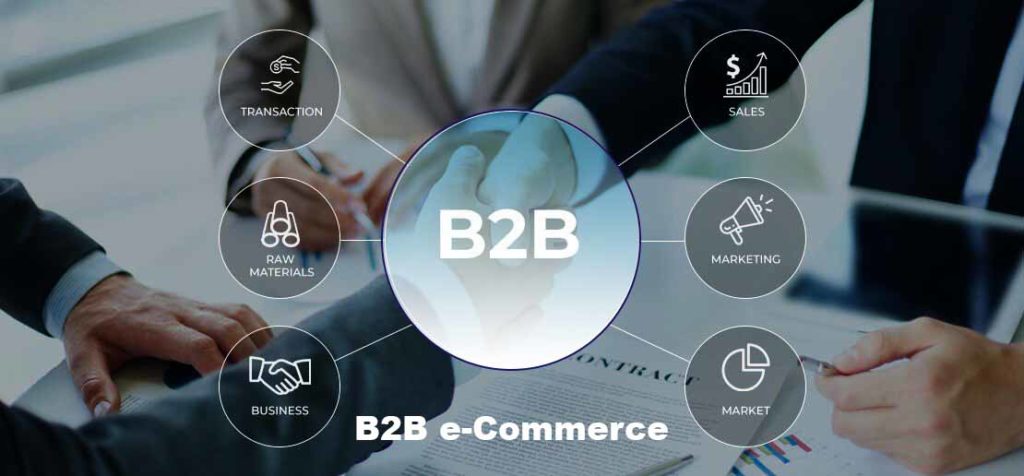Not so long ago, companies would handle their business in traditional classic ways. For instance, companies would keep inventory records on paper, send their purchase orders via fax, and use phones to inquire about quotes. Today, the market has changed. It’s moving towards a more digitalized trend. Businesses are converting their information into digital data to meet market requirements. As a result, many practices are done to support the digital transformation process for businesses. In 2022, the most common one is integrating a B2B eCommerce. Especially when it comes to the manufacturing industry. Simply, the definition of digital transformation is the process of using digital technologies to create new business processes to meet the new market requirements.
There are many types of eCommerce platforms for B2B, B2C, B2B2C, or B2G for facilitating buying and selling goods or services using the internet. These different platforms serve many channels like manufacturer, supplier, distributor, or even end-user. In fact, the most important decision for any business to succeed in selecting the right eCommerce solution that meets the company’s business requirements. As a matter of fact, integrating a B2B eCommerce platform, specifically in the manufacturing industry, is critical in the success of its digital transformation process.

What is B2B, Verses B2C & B2G eCommerce?
Business-to-Business (B2B) or (B to B), refers to a business that is conducted between companies, rather than between a company and an end-user consumer. Simply, B2B eCommerce is an online business model a form of business transactions between two businesses, like manufacturer and wholesaler or a wholesaler and a retailer.
Business-to-Consumer (B2C) refers to a business that is conducted between a business and consumer. It is the process of selling products and/or services directly to the end-users.
Business to Government (B2G) refers to the sale and marketing of goods and services to the federal state or local agencies.
How B2B ECommerce is Integrated within the Manufacturing Industry?
Goes without saying, B2B platforms are found in almost every industry from manufacturing to retail! Wherever business is handled, there will be a need for hosting of B2B suppliers. For example, manufacturers, for instance, offer raw materials or finished parts to other businesses that would need to operate with them. Then, they sell their products to other businesses like wholesale or end-users. Thus, every business would need to operate both B2B and B2C platforms likewise. Nowadays, manufacturers are realizing more and more every day the importance of integrating both B2B and B2C models into their strategy.

“By 2024, 15% of B2B organizations will use digital commerce platforms to support both their customers and sales reps in all sales activities.”
According to Gartner
Manufacturers produce finished products by using spare parts and raw materials, in conjunction with labor and machines. Subsequently, these finished products are sold to other manufacturers or wholesalers via a B2B platform.
A typical B2B model in the manufacturing industry is the automotive industry! In fact, B2B transactions are the backbone of the automotive industry. Many vehicle components are manufactured independently and auto manufacturers purchase these parts to assemble automobiles. For example, these parts are tires, batteries, electronics, hoses, and door locks. These are usually manufactured by various manufacturers and sold directly to automobile manufacturers.
How the Manufacturing Industry is Responding to Digital Transformation?

In the past, many manufacturers struggled with their “offline” traditional ways of reaching their customers. This classic way caused them, not only to lose revenue but also lose potential customers who are digitally driven!
Today, B2B eCommerce digital transformation, specifically in the manufacturing industry became inevitable! Businesses are driven by challenging consumer needs and demands. In other words, it’s the “Consumer Behaviour,” that shapes the market trends. Thus, consequently, this put pressure on the manufacturers towards implementing digital channels and integrating B2C, B2B, or B2B2C eCommerce platform models into their businesses.
With the increased customers demand online buying channels, manufacturers have no choice but to revamp their business strategies to be able to survive. According to Elastic Path, the B2B buying process is rapidly digitizing and becoming omnichannel.
- 61% of all B2B transactions start online
- 73% of buyers generally use digital channels
- Multi-channel customers are 25% more profitable than human-only interactions
Manufacturers who invest in digital transformation will be adopting new technologies such as headless commerce, voice commerce, CPQ, PIM system, AI (Artificial Intelligence) driven technology solution, and machine learning.
What are the Advantages of Integrating a B2B
ECommerce model to the Manufacturing Businesses?
Nevertheless, the benefits of integrating B2B eCommerce into the manufacturing industry are very clear. Once the manufacturer provides a convenient and informative online buying experience, via the B2B platform for their customer, they will be chosen to go to a supplier!
Most importantly, manufacturers need to offer self-service capabilities and a transactional website for their customers. Manufacturers should have their number one goal while creating an eCommerce web store, which is to meet their customer’s business requirements and expectations to retain their loyalty.
What are the Key elements a Customer Looks for while Choosing a Supplier/Manufacturer?
- Informative Web-Store: Customers expect to find a reliable accurate information, whether they are looking for inventory, product details, order history, or their personalized negotiated discounts!.
- Convenience: Customers would like to access their web store whenever and wherever they are. Also, customers want a seamless website that is quick and easy to navigate to find solutions for their needs.

Online Store
How Manufacturers Implement a B2B ECommerce Model into Their Business?
Here are some key factors every manufacturer should consider while creating their B2B eCommerce Online Store:
1. Provide Your Customer with a Personalized Catalogue
It is common in the manufacturing industry to have an extensive product line with many different catalogs that are intended for different customers. Also, these products’ prices can vary for each customer. Nonetheless, manufacturers may hesitate to share their pricing online. Thus, tailoring and customizing different catalogs with personalized product suggestions based on customers’ needs is key!
Customizing and personalizing catalogs for customers encourages cross-selling and up-selling opportunities. This, will in turn lead to increased conversions! Also, specific pricing and product personalization are done throughout a B2B web store.
If you are finding difficulty with your large product line and personalizing your catalogs, you can consult one of our experts at DigiCommerce. You can also request to see a demo for your personalized catalog and explore how it can benefit your business.
2. Ensure Visibility of Your Product Lines to Your Customer
Businesses in the manufacturing industry usually have very high traffic for spare parts. An ERP integrated B2B eCommerce platform allows manufacturers to match these spare parts with their products. Consequently, cross-selling and up-selling are made easy and efficient for the customer. Therefore, the customer benefits of saving time and effort searching for connecting parts. Certainly, implementing a B2B commerce platform, not only helps improve service and efficiency, but also retains happy and loyal customers!
3. Help Your Customers to Configure Your Products Online
Customers can configure, customize products to their own requirements and preferences without reaching out to your sales support staff. The main advantage of a B2B platform is providing your customer with the flexibility, ability to match products that differ in shape, size, or color. Consequently, the manufacturer saves time and effort to both their customer and their business.
4. Sell Your Complete Product Lines Online
As a manufacturer, you must have vast product lines including hundred or even thousands of products. Selling all your products lines, not easy by the regular average sales personnel.
Manufacturers usually may end by selling only just a small percentage of their product lines. Thus, implementing a B2B online store will diversify and offer different sales channels to the customer. These channels will allow the customer to learn about the different variety of product lines the manufacturer.
For example, many different tools such as quick search, add filters, search suggestions educate the customer about their manufacturer inventory. Thus, this will increase the chances of selling new products, additional and alternative products the customer may need!
5. Attract New Potential Customers Online
As a matter of fact, search engines such as Google or Bing, play a significant role in finding “New Potential Customers” to your business. According to Google, 80% of internet users do research as they make buying decisions.
That is to say, during the customer buying journey, the customer conducts an online search for information or solutions to their business needs. Consequently, having a strong and optimized eCommerce online presence is a key for search engines for attracting new prospects. When a B2B business model is integrated into a manufacturer platform, all product lines data will be available online. Thus, this may lead a potential new customer to land on the manufacturer’s page to find answers to his search.
To summarize, content for eCommerce is the driving force for achieving a purchase and winning a new potential customer.

How to Choose an ECommerce Platform that Fits Your Business Requirements?
Certainly choosing an eCommerce platform that meets your business requirements is as equally important as implementing it!
Most importantly, tailoring and customizing your B2B eCommerce features and meeting your business requirements no doubt, above all. Based on your business strategy, your choice of which platform to integrate is a key factor in the success of your business strategy!
In addition, there are many factors and considerations that must be taken into account while integrating digital transformation into your business like budget, target audience, hosting, scalability, web traffic, & customer service.
On the other hand, the cost of integrating an eCommerce site is arguably the most important consideration to factor in. That is to say, it is vital for the manufacturer to select an eCommerce platform and integration strategy that meets the manufacture business requirements!
What Options of B2B ECommerce Solutions To Choose From?
Levering a fully Integrated B2B, B2C, D2C, and B2B2C Solution for Headless Commerce Platform is a key to the success of every business. DigiCommerce offers a complete B2B solution that integrates with your preferred Headless Commerce Platform. B2B Connect solution meets all your business technical needs, including integrations, mobile devices, desktop, and multi-Platforms.
Alternatively, a Pre-Composed solution for B2B Commerce could be another solution that fits your business requirements. This solution, designed in partnership with elastic path, pre-configures B2B commerce functionally from Elastic Path Commerce Cloud. It is equipped with a pre-built experience for B2B buyers and sellers. This solution simplifies the process with a business-ready solution that provides a quick start to launch complex and unique B2B experiences. Similarly, Compassable Commerce can help you find solutions for your business needs and requirements.
In short, now is the time for digital transformation — especially for B2B businesses. Is your current solution really meeting your current and future business needs? Thus, to learn more about how to find the best platform that fits your needs, you can reach out to one of the DigiCommerce experts.
Today, customers are the new ‘market-makers’ who are ‘redesigning’ all industries and altering how companies can succeed online!
According to research conducted by Forrester

